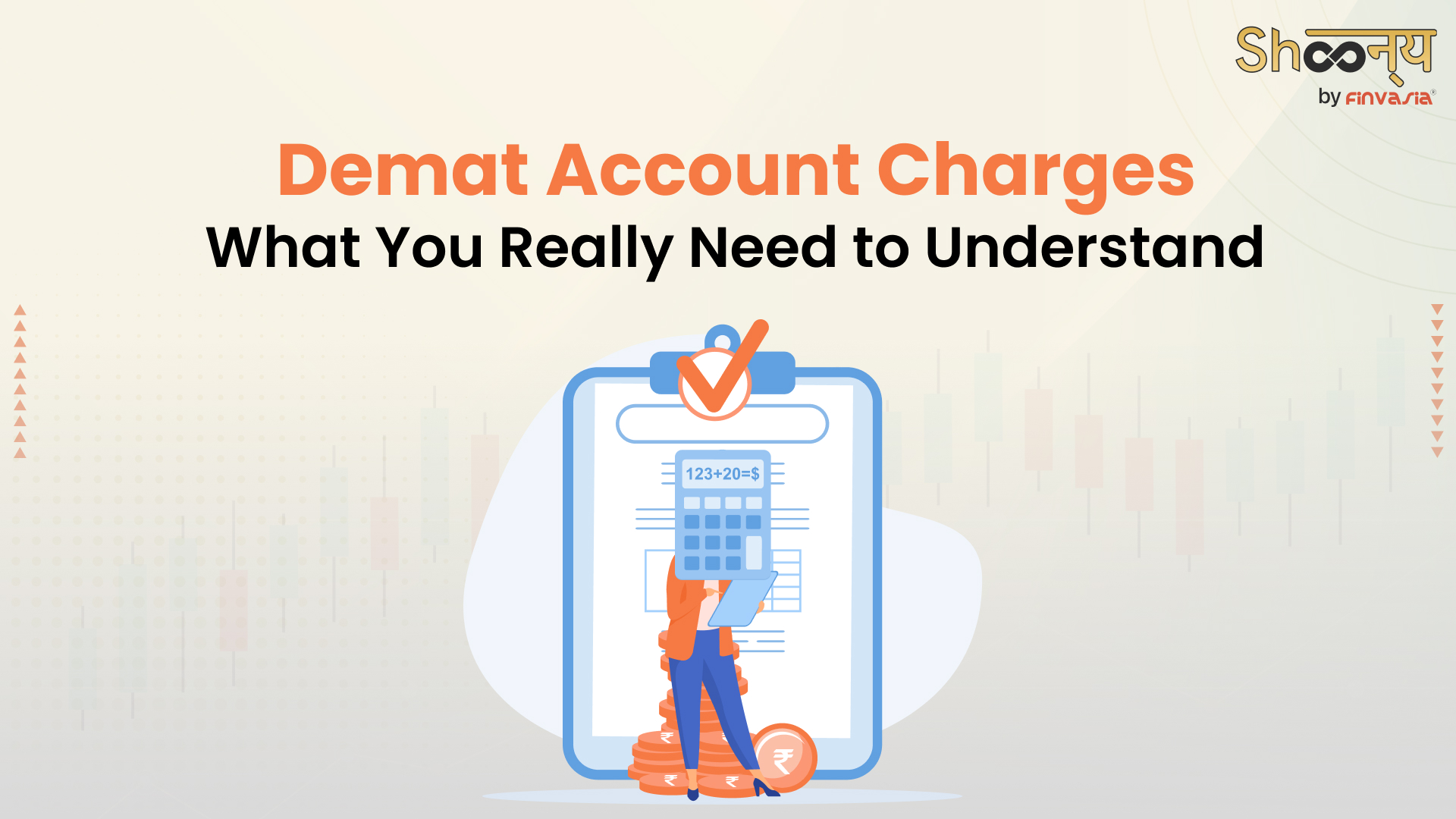Demat Account Charges and Fees in India

Are you considering entering the stock market? Are you aware that opening a demat account is mandatory if you wish to trade in the Indian stock market? Opening and maintaining a demat account involves several charges, including annual maintenance fees, custody charges, and transaction fees.
Let’s understand all the demat account charges today!
Depository Charges
Depository charges are fees you pay to keep your stocks safe in an electronic account. These represent the fees levied by your depository participant (DP) for services like safekeeping and maintenance of your securities. These demat account charges are important because they help maintain the system that keeps your investments secure.
As per SEBI, investors are required to pay the demat charges towards:-
– Dematerialisation and Rematerialisation of their securities
– Annual account maintenance charges
– Transaction fees (only for sell transactions)
Now, understanding these demat charges is crucial for you in choosing the right stock broker.
Demat Account Opening Charges
In India, to start trading or investing in the stock market, you’ll need an online Demat account. This account acts like a digital wallet, where you store all your stocks and securities instead of carrying them physically.
Now, to open a Demat account, there are some charges involved. These charges can vary depending on the broker you choose.
Demat account opening charges are one-time fees incurred when you initiate the process of opening a demat account with a DP. It’s essential to compare these charges among different DPs to find the most cost-effective option for your needs.
Open a free demat account today!
In addition, there might be other charges, such as Annual Maintenance Charges (AMC), which you pay every year to maintain your account.
What does a DP levy on these various types of demat account charges?
These charges intend to cover the expenses of maintaining your account and providing you with services like safekeeping your securities, easy share transfer, and access to market updates.
Demat Account Maintenance Charges
Now, to keep this account running smoothly, you’ll have to pay what’s called Annual Maintenance Charges (AMC). These charges are like a fee you pay every year to maintain your Demat account.
The AMC isn’t fixed; it varies from one stockbroker to another.
Usually, it ranges from a couple of hundred rupees to a thousand rupees per year. Some brokers may even offer zero AMC.
These charges are usually billed annually or semi-annually and cover the operational costs associated with maintaining the account.
The purpose of AMC is to cover the broker’s costs in managing your Demat account. This includes maintaining the infrastructure, providing customer support, and complying with regulatory requirements.
The SEBI revised Basic Services Demat Account (BSDA) doesn’t incur annual maintenance charges for debt securities up to ₹50,000. However, for holdings between ₹50,000 to ₹2 lakhs, a maximum of ₹100 plus taxes may apply.
How about a free demat account with zero AMC?
Remember, while choosing a broker, don’t just focus on the lowest AMC. You must consider other factors like their service quality, trading platform, and customer support.
Custody Charges
Custody charges are associated with securely storing your securities in digital form by entities like NDSL or CDSL. DPs typically collect one-time custody charges, although some may waive them.
Demat Transaction Charges
Demat transaction charges are fees imposed for every transaction conducted in your demat account. These charges vary based on the volume and type of transactions.
Once your demat account is ready for trading, you can add money and start buying or selling shares. When you make a trade, your broker takes a cut from the total amount.
Demat transaction charges may be in the form of a percentage or a flat fee.
Instead of charging a percentage, some brokers just charge a fixed fee.
Demat Charges for Account Closure and Securities Transfer
No Charges for Securities Transfer
SEBI, since January 9, 2006, advises that no charges should be imposed by a depository on a depository participant (DP) and, consequently, by a DP on a beneficial owner (BO) when all securities in the BO’s account are transferred to another branch of the same DP, another DP of the same depository, or another depository. This applies only if the BO account at the transferee DP matches identically with the BO account at the transferor DP. If the transferor DP holds a joint account, the transferee DP should also hold a joint account with the same ownership sequence.
How Do You Save on these Demat account charges?
What if we told you that you could save on these demat account charges and trade with lowest charges?
With Shoonya, you get a free Demat account with no Annual Maintenance Charges (AMC). Plus, you can trade commission-free in mutual funds, IPOs, bonds, and more!
Demat Account Charges with Shoonya
Shoonya, the depository participant in India, offers cost-effective demat account charges.
- Free demat account opening
- Free HUF and LLP account
- Free annual maintenance charges
- 0 Trading platform charges
- Zero brokerage across IPOs, bonds, and mutual funds.
What are you waiting for?
Download the Shoonya App and open your free demat account!
FAQs| Demat Account Charges
Opening a Demat account is often free, but there may be other charges like annual maintenance fees or trading fees. With Shoonya, you can open a free demat and a trading account.
To open a Demat account, select a Depository Participant, fill out the online form, submit the required documents, and complete the e-KYC process.
Benefits of a Demat account include secure electronic holding of securities, quick transfers, elimination of physical certificate risks, and ease of monitoring investments.
Source– sebi.gov.in
______________________________________________________________________________________
Disclaimer: Investments in the securities market are subject to market risks; read all the related documents carefully before investing.








